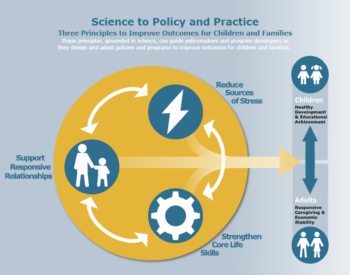
A recent “Science to Policy and Practice” whitepaper released by Harvard University’s Center on the Developing Child was very encouraging in that it highlighted “Three Principles to Improve Outcomes for Children and Families” — all of which are fundamental to Mountain Home’s model of care.
The paper, grounded in the scientific understanding of how childhood experiences starting at birth, or even prenatally, affect lifelong outcomes combined with new knowledge about what adult need to thrive recommended three main areas of focus, noting “to be maximally effective, policies and services should:
- Support responsive relationships for children and adults.
- Strethen core life skills.
- Reduce sources of stress in the lives of children and families.”
Mountain Home model is built around exactly these three principles. By providing not only housing and basic needs but also ongoing case management and mental health support, Mountain Home follows best practices for reducing family stress and “helping parents strengthen the skills they need to create stable and supportive home environment.”
Through our ongoing parenting and life-skills classes, intensive supportive employment and education program, and personalized treatment plans — we strengthen core life skills by “adopt coaching models that help individuals identify, plan for, and meet their goals.”
And what was perhaps most validating to learn from this study is how much relationships matter — as responsive adult and child relationships have always been center to Mountian Home’s approach, which is based on the best practices of Circle of Security Parenting, Postive Youth Development, and Trauma-informed Care. The study noted how when service providers “listen responsively” and “treat clients with respect” as well as create safe environments where parents can respond to the needs of their children — the advantages are great for young children — as “when adults model responsive relationships, the benefits come full circle, ultimately helping children become healthy, responsive parents themselves.”
Center on the Developing Child at Harvard University. “3 Principles to Improve Outcomes for Children and Families.” 2017.
Available at https://developingchild.harvard.edu/resources/three-early-childhood-development-principles-improve-child-family-outcomes/. Accessed 11-19-2018.

